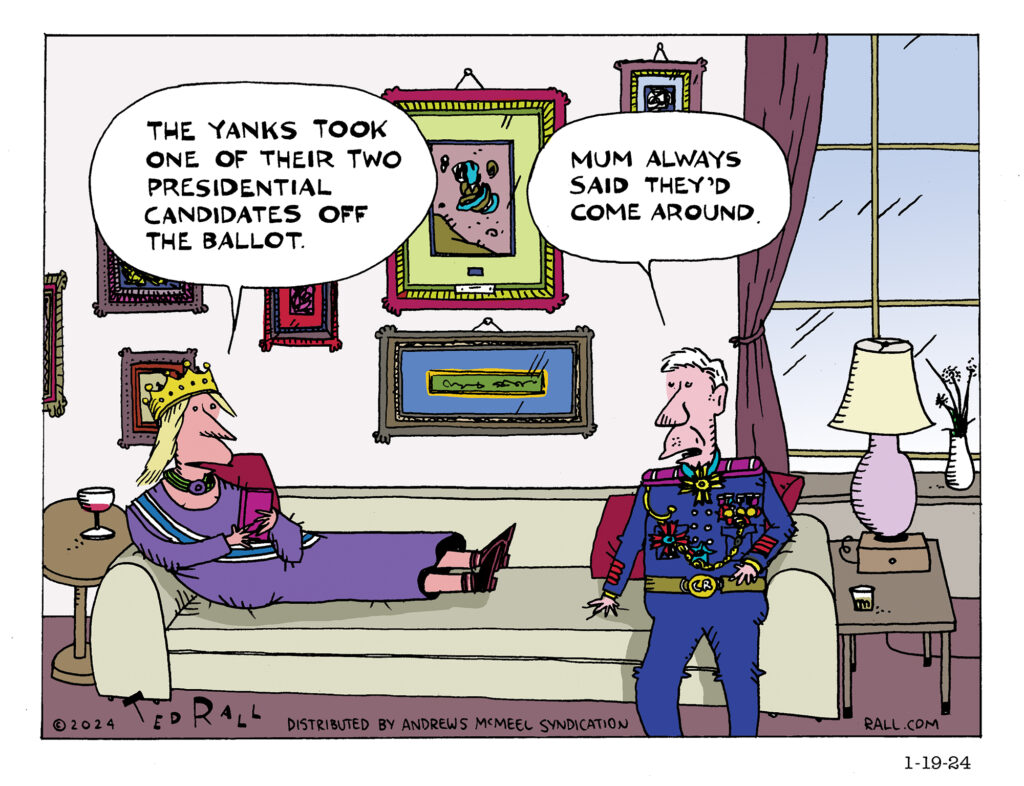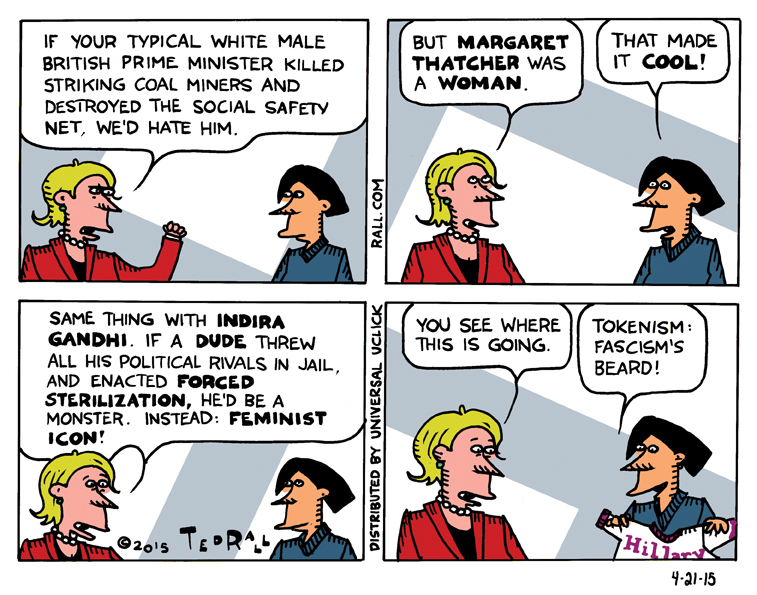The Supreme Court has been asked to determine whether Donald Trump can be removed from the ballot under the 14th Amendment. In a two-party system, there will be implications.
The Final Countdown – 11/14/23 – Is Bidenomics Working? Fed Says ‘Yes’, Americans Disagree
 On this episode of the Final Countdown, hosts Ted Rall and Angie Wong discussed several topics from around the globe, including the latest inflation numbers and their effect on the U.S. economy.
On this episode of the Final Countdown, hosts Ted Rall and Angie Wong discussed several topics from around the globe, including the latest inflation numbers and their effect on the U.S. economy. SYNDICATED COLUMN: Who’s Really To Blame for Brexit (and Trump)
 At this writing, securities markets and the international community are reeling at the news that British voters have opted to leave the European Union. The “Brexit” has provoked angry reactions from the pro-Remain camp, who accuse Leave voters of stupidity, shortsighted ignorance and, worse, thinly-disguised racism and nativism posing as nationalism.
At this writing, securities markets and the international community are reeling at the news that British voters have opted to leave the European Union. The “Brexit” has provoked angry reactions from the pro-Remain camp, who accuse Leave voters of stupidity, shortsighted ignorance and, worse, thinly-disguised racism and nativism posing as nationalism.
Political analysts point out that British voters were divided geographically – Scotland wanted to stay, England wanted to leave – as well as demographically. One chart that managed to go semi-viral online displayed high support for the Brexit among older voters, opposition among the young, alongside the actuarial average years remaining that each age group would have to live with the consequences of the vote. The smartest of these pundits focus on the class divide between shiny expensive youth-oriented cities like London, where pro-European sentiments are strong, and England’s version of the Rust Belt, abandoned hellholes where citizens barely subsist in a ruined landscape of shut down factories and widespread unemployment.
“If you’ve got money, you vote in,” a voter in Manchester told The Guardian. “If you haven’t got money, you vote out,” she said.
Amid all the concern about a collapsing British pound and the possible dissolution of not only the European Union – looks like France and the Netherlands may have a similar plebiscite in the near future – but also the United Kingdom, everyone’s out to cast blame. However, no one is pointing at those who are most responsible if (and it’s far from certain) Brexit leads to an economic downturn and/or a political debacle: the West’s incompetent political class, and its idiotic enablers in the corporate media.
The postwar order began to fray during the 1970s, when business leaders and their allies in government started to push aggressively for policies that encouraged the transfer of manufacturing industries to the developing world away from what was then called the First World in preparation for what we now call the information economy. Globalization is the shorthand term for deindustrialization – some call it outsourcing, others prefer the simpler “shipping jobs overseas” – and digitalization of culture and intellectual property.
This essay isn’t about whether globalization is good or bad. It’s about the way a trend that has been consistently declared irreversible has been poorly managed. That mismanagement led to the Brexit, and may elect Donald Trump.
Even during the 1970s, globalization’s downward pressure on wages was easy to foresee. Capital was becoming increasingly fluid, crossing borders with incredible ease in search of places and people where the production of goods and services could be done as cheaply as possible. If you own a factory in Michigan, and you can figure out a way to transport your product to market at reasonable cost, doing the patriotic “made in USA” thing feels like leaving money on the table when you consider what your expenses would look like in Vietnam or Indonesia.
Workers, on the other hand, are confined by international borders, linguistic and cultural limitations, family ties, and just plain inertia, to the nations — and often the regions within those countries — where they were born. If the highest wages in the world are paid in the United Arab Emirates, you can’t just hop on a plane and expect to find a job, much less a work permit. Workers are stuck; capital moves freely. This economic imbalance between labor and management is a significant contributing factor to the decline in real median wages in countries like Great Britain and the United States since the 1970s.
Now let’s say that you’re a high-ranking member of the ruling class: a Fortune 500 CEO, a head of state, a congressman, the publisher of a big-city newspaper. You don’t need a major in history or political science in order to anticipate that subjecting tens of millions of people to long-term unemployment and underemployment is a recipe for social dysfunction and the kind of class resentment that can be exploited by a demagogue or radical populist movement.
You can do one of two things with that knowledge. You can ignore victims of economic dislocation. Or you can help them.
If you ignore them, if you greedily grab up every dollar and pound and euro you can while city after city slowly collapses into alcoholism, drug abuse and rising crime, you know you’re setting yourself up for a future of political instability. It may take a long time, but the chickens will come home to roost. When things turn ugly, it could cost you a pile of cash you amassed during your orgy of greed.
That’s what happened during the 1980s, when Margaret Thatcher and Ronald Reagan dismantled the post-World War II social safety nets. Precisely at a time when the UK and the US needed more welfare, national healthcare and public education programs, they slashed them instead. Those austerity policies continued under Tony Blair, Bill Clinton, David Cameron, and – against reason and common sense – under Barack Obama after the 2008 economic meltdown.
The British and American political classes made a conscious decision over the last 40 to 50 years not to lift a finger to help those who lost their jobs to deindustrialization and globalization. Go back to college, they say. Get retrained. But most Americans can’t afford college tuition — the jobless least of all! We need(ed) a GI Bill for the dispossessed.
Even this week, many establishment types continue to criticize aging pensioners and unemployed workers over age 50, denigrating them as selfish, clueless, unwilling and unable to adapt themselves to the new – brutal – world in which we find ourselves.
No doubt: nativism and racism played a role in the Brexit vote. England is an island nation with an island mentality. Though only a few thousand Syrians entered the UK last year, with nary a passport check, images of refugees riding the roof of trains from France through the Chunnel felt like an invasion to some Britons. But bigotry shouldn’t let us ignore the economic factor. When jobs are plentiful and salaries are rising, no one minds immigration. Xenophobia grows in the soil of scarcity.
What did the elites think? Did they really believe it was possible to make so many people so desperate and so angry for so long without a risk of them lashing out?
Donald Trump is not a brilliant man. But the political classes could learn a lesson from him. He knows that an awful lot of people are angry. And he knows why.
(Ted Rall is the author of “Bernie,” a biography written with the cooperation of Democratic presidential candidate Bernie Sanders. His next book, the graphic biography “Trump,” comes out July 19th and is now available for pre-order.)
Babies With Three Parents: What UK Approval Really Means
Originally published at ANewDomain.net:
Everyone knows how the political system works. Whenever there is a pressing need for legislative action, the politicians do nothing at all. Either that, or they wait until lots of people die, then enact laws that half-fix the problem, usually making things worse.
A case of the former in the United States: climate change. Not only has U.S. Congress failed to act, but the political party that controls both houses of Congress won’t even admit that the problem exists. An example of the latter is healthcare. Tens of thousands of Americans have been dying every year because they can’t afford to see a doctor, so finally the United States joined the rest of the world by passing a national healthcare system, a.k.a. Obamacare, which may mark the first time in history that the US government has charged poor people a fine for refusing to buy a service.
We know that this is not a good system.
But it is the system that America, like most other countries, has always had. In the same way that people who live near rhinos know that they may get stomped by one of the armored creatures on a rampage, Americans are accustomed to the dysfunction of their political system. While it might be too much to say that we like to pay a substantial share of our income in taxes to support a government that either ignores our needs and desires, or messes things up even worse when it pays attention to them, no one expects this to change anytime soon.
As with the sun rising in the east, this is our reality.
Which is why the latest news from Great Britain makes our selective heads hurt.
“Britain’s House of Commons gave preliminary approval Tuesday to permitting scientists to create babies from the DNA of three people, a technique that could protect some children from inheriting potentially fatal diseases from their mothers,” reports the Associated Press.
Whaaaaaaaa—?
Did you know it was possible to make kids out of three people’s DNA?
No. Bet you didn’t.
How do I know? Because I didn’t. And I’m a double nerd: I read all the news and I’m especially interested in science. If there’s a weird story about science, and anyone has heard about it, it’s me.
Pretty freaky stuff. But that’s not the point here. The point is, Britain’s political system – which is even older than ours – is legalizing something that most people haven’t even heard of, much less been able to form an opinion about.
So far along are the Brits with this whole three-parent thing that their ethicists are publicly expressing a concern that this will open the door to eugenics on a grand scale, so-called “designer babies” whose genetic makeup would be predetermined by parents taking off a checklist of yesses and nos.
“The technique involves removing the nucleus DNA from the egg of a prospective mother and inserting it into a donor egg from which the nucleus DNA has been removed. This can be done before or after fertilization. The resulting embryo would have the nucleus DNA from its parents but the mitochondrial DNA from the donor. Scientists say the DNA from the donor egg amounts to less than 1 percent of the resulting embryo’s genes,” says the AP.
Whoa.
If 50 percent of Americans can define the word “mitochondria,” I will eat a garden slug. Hell, if 50 percent of American Congressmen were aware of this technique before today’s news, I’ll eat two.
I find it deeply distressing that there is an actual nation, much less one which kind of speaks English as one of its major languages, whose elected representatives (a) know anything about science, (b) know something about science before I do, and (c) have absorbed that knowledge so thoroughly that they are ready to propose, debate and actually pass a law in response to their scientific knowledge.
Forget Sputnik.
America is over.
SYNDICATED COLUMN: Game of Drones – New Generation of Drones Already Choose Their Own Targets

“The drone is the ultimate imperial weapon, allowing a superpower almost unlimited reach while keeping its own soldiers far from battle,” writes New York Times reporter James Risen in his important new book “Pay Any Price: Greed, Power, and Endless War.” “Drones provide remote-control combat, custom-designed for wars of choice, and they have become the signature weapons of the war on terror.”
But America’s monopoly on death from a distance is coming to an end. Drone technology is relatively simple and cheap to acquire — which is why more than 70 countries, plus non-state actors like Hezbollah, have combat drones.
The National Journal’s Kristin Roberts imagines how drones could soon “destabilize entire regions and potentially upset geopolitical order”: “Iran, with the approval of Damascus, carries out a lethal strike on anti-Syrian forces inside Syria; Russia picks off militants tampering with oil and gas lines in Ukraine or Georgia; Turkey arms a U.S.-provided Predator to kill Kurdish militants in northern Iraq who it believes are planning attacks along the border. Label the targets as terrorists, and in each case, Tehran, Moscow, and Ankara may point toward Washington and say, we learned it by watching you. In Pakistan, Yemen, and Afghanistan.”
Next: SkyNet.
SkyNet, you recall from the Terminator movies, is a computerized defense network whose artificial intelligence programming leads it to self-awareness. People try to turn it off; SkyNet interprets this as an attack — on itself. Automated genocide follows in an instant.
In an article you should read carefully because/despite that fact that it will totally freak you out, The New York Times reports that “arms makers…are developing weapons that rely on artificial intelligence, not human instruction, to decide what to target and whom to kill.”
More from the Times piece:
“Britain, Israel and Norway are already deploying missiles and drones that carry out attacks against enemy radar, tanks or ships without direct human control. After launch, so-called autonomous weapons rely on artificial intelligence and sensors to select targets and to initiate an attack.
“Britain’s ‘fire and forget’ Brimstone missiles, for example, can distinguish among tanks and cars and buses without human assistance, and can hunt targets in a predesignated region without oversight. The Brimstones also communicate with one another, sharing their targets.
[…]“Israel’s antiradar missile, the Harpy, loiters in the sky until an enemy radar is turned on. It then attacks and destroys the radar installation on its own.
“Norway plans to equip its fleet of advanced jet fighters with the Joint Strike Missile, which can hunt, recognize and detect a target without human intervention.”
“An autonomous weapons arms race is already taking place,” says Steve Omohundro, a physicist and AI specialist at Self-Aware Systems. “They can respond faster, more efficiently and less predictably.”
As usual, the United States is leading the way toward dystopian apocalypse, setting precedents for the use of sophisticated, novel, more efficient killing machines. We developed and dropped the first nuclear bombs. We unleashed the drones. Now we’re at the forefront of AI missile systems.
The first test was a disaster: “Back in 1988, the Navy test-fired a Harpoon antiship missile that employed an early form of self-guidance. The missile mistook an Indian freighter that had strayed onto the test range for its target. The Harpoon, which did not have a warhead, hit the bridge of the freighter, killing a crew member.”
But we’re America! We didn’t let that slow us down: “Despite the accident, the Harpoon became a mainstay of naval armaments and remains in wide use.”
U-S-A! U-S-A!
I can see you tech geeks out there, shaking your heads over your screen, saying to yourselves: “Rall is paranoid! This is new technology. It’s bound to improve. AI drones will become more accurate.”
Not necessarily.
Combat drones have hovered over towns and villages in Afghanistan and Pakistan for the last 13 years, killing thousands of people. The accuracy rate is less than impressive: 3.5%. That’s right: 96.5% of the victims are, by the military’s own assessment, innocent civilians.
The Pentagon argues that its new generation of self-guided hunter-killers are merely “semiautonomous” and so don’t run afoul of a U.S. rule against such weapons. But only the initial launch is initiated by a human being.” It will be operating autonomously when it searches for the enemy fleet,” Mark Gubrud, a physicist who is a member of the International Committee for Robot Arms Control, told the Times. “This is pretty sophisticated stuff that I would call artificial intelligence outside human control.”
If that doesn’t worry you, this should: it’s only a matter of time before other countries, some of which don’t like us, get these too.
Not much time.
(Ted Rall, syndicated writer and cartoonist, is the author of the new critically-acclaimed book “After We Kill You, We Will Welcome You Back As Honored Guests: Unembedded in Afghanistan.” Subscribe to Ted Rall at Beacon.)
COPYRIGHT 2014 TED RALL, DISTRIBUTED BY CREATORS.COM
SYNDICATED COLUMN: “1984” Is Here. Yawn.
Orwell’s Nightmares Come True — But Who Cares?
Another horror no one will care about: the government is spying on your snail mail.
The New York Times timed the release of the story so that it would come and go without notice: on the Fourth of July, when no one reads the paper or watches the news. But buried beneath a puffy lede is yet another privacy-killing whopper. After 9/11, the Times reports, the U.S. Postal Service created something called the Mail Isolation Control and Tracking (MICT) program, “in which Postal Service computers photograph the exterior of every piece of paper mail that is processed in the United States — about 160 billion pieces last year. It is not known how long the government saves the images.”
Just a wild guess? How about: forever?
“Together,” the paper continued, “the two programs show that postal mail is subject to the same kind of scrutiny that the National Security Agency has given to telephone calls and e-mail.” Any government agency — the FBI, local police, etc. — can request mail cover data. As with the rubber-stamp “FISA court,” the USPS almost always says yes to these outrageous mass violations of privacy.
From George Orwell’s “1984”: “As for sending a letter through the mails, it was out of the question. By a routine that was not even secret, all letters were opened in transit.”
“It’s a treasure trove of information,” the Times quotes former FBI agent James Wedick. “Looking at just the outside of letters and other mail, I can see who you bank with, who you communicate with — all kinds of useful information that gives investigators leads that they can then follow up on with a subpoena.” Your finances. Your politics. Your friends.
No doubt about it, the dystopian vision laid out by George Orwell in “1984” is here.
Thanks to NSA leaker Edward Snowden, we’ve learned about the previously top-secret PRISM program, in which the U.S. government “collects the e-mail, voice, text and video chats” of every American to be stored in a $2 billion data farm in Utah, as well as sweeping telephone surveillance by Verizon and other telecommunications companies on behalf of the NSA. According to NBC News and other sources, “every single phone call made in the U.S. has been monitored by the U.S. government.” And not, merely, as President Obama and his media shills keep saying, “just” (!) the metadata. Under ECHELON, they listen in to “all telephone, fax and data traffic,” record it, and store it.
From “1984”: “There was of course no way of knowing whether you were being watched at any given moment. How often, or on what system, the Thought Police plugged in on any individual wire was guesswork. It was even conceivable that they watched everybody all the time. But at any rate they could plug in your wire whenever they wanted to.”
Yes they can.
The dominant eavesdropping technology in “1984” was a device called the “telescreen.” Installed in every home and workplace as an outlet for government propaganda, Orwell’s telescreen “received and transmitted simultaneously. Any sound that Winston made, above the level of a very low whisper, would be picked up by it, moreover, so long as he remained within the field of vision which the metal plaque commanded, he could be seen as well as heard.”
Which sounds a lot like the creepy new two-way TV — you watch it and it watches you — for which Verizon filed a patent application in 2011. This TV would target “ads to viewers based on information collected from infrared cameras and microphones that would be able to detect conversations, people, objects and even animals that are near a TV. If the detection system determines that a couple is arguing, a service provider would be able to send an ad for marriage counseling to a TV or mobile device in the room,” reported the blog Fierce Cable. “If the couple utters words that indicate they are cuddling, they would receive ads for ‘a romantic getaway vacation, a commercial for a contraceptive, a commercial for flowers,’ or commercials for romantic movies, Verizon states in the patent application.”
Verizon’s patent was denied. But now Google TV is going for it. The technology exists; it’s only a matter of time before it finds its way into our homes. Anti-privacy tech types point out it’s only to make ads more effective — the same way web ads react to your searching and browsing. But that’s just for now. It isn’t a stretch to imagine the NSA, FBI or other crazy spook outfit tapping into America’s telescreens in order to watch us in our living rooms and bedrooms.
Gotta stop the terrorists! Whatever it takes.
Ah, the terrorists. The enemies of the state. Bush had his Osama; Obama has Snowden. Bugaboos keep us distracted, fearful, compliant. “The heretic, the enemy of society, will always be there, so that he can be defeated and humiliated over again,” the government official goon O’Brien lectures Winston Smith in “1984.” “The espionage, the betrayals, the arrests, the tortures, the executions, the disappearances will never cease.”
They can’t.
Governments rule over the governed either by obtaining their tacit consent, or by crushing potential opponents by making them afraid to speak up. Option two is where we are now.
One horror follows another. At Guantánamo concentration camp, where les misérables of America’s War of Terror languish for year after year, uncharged with any crime, U.S. government goons announced that they will continue to force-feed more than 100 hunger strikers during Ramadan, a month-long holiday when devout Muslims are required to fast. WikiLeaks founder Julian Assange is trapped in the Ecuadorean embassy in London because he fears extradition to and execution by the U.S.; Ecuador has discovered that some Western intelligence agency planted a bug to watch him. Meanwhile, Edward Snowden has been de facto stripped of his U.S. citizenship, his passport canceled, rendering him effectively stateless. Meanwhile, the megacriminals he exposed — Obama and his cronies — are living large.
Assange and Snowden are no longer important. They’ve done all the damage they can do. But the U.S. will never leave them, or any other enemy of the state, alone. It’s about terrifying potential political opponents into submission.
“Do not imagine that you will save yourself, Winston, however completely you surrender to us. No one who has once gone astray is ever spared,” O’Brien tells Winston. “We shall squeeze you empty, and then we shall fill you with ourselves.”
Enjoy your barbecue.
(Ted Rall’s website is tedrall.com. His book “After We Kill You, We Will Welcome You Back As Honored Guests: Unembedded in Afghanistan” will be released in 2014 by Farrar, Straus & Giroux.)
COPYRIGHT 2013 TED RALL
SYNDICATED COLUMN: Get Pissed Off and Break Things
Why Are Americans So Passive?
There’s a reason “Keep Calm and Carry On” is everywhere. When people lose everything — their economic aspirations, their freedom, their privacy — when there’s nothing they can do to restore what they’ve lost — all they have left is dignity.
Remember Saddam? Seconds before he was hanged, disheveled and disrespected, the deposed dictator held his head high, his eyes blazing with contempt as he spat sarcastic insults at his executioners. He “faced death like a lion,” said his supposed body double, Latif Yahia, and no one could argue. He left this life with the one thing he could control intact.
Dignity. That’s what “Keep Calm and Carry On” is all about. That’s what we think of when we think of the Battle of Britain. As German bombs rained down, the English went about their business. Like the iconic photo of the milkman tiptoeing over rubble. Like the bomb-damaged stores whose shopkeepers posted signs that read “We are still open — more open than usual.”
Man, that is so not us.
You’ve seen the T-shirts, with their clean Gill Sans-esque lettering and iconic crown. There are mugs, postcards and posters. Of course. It’s a reproduction of a propaganda poster from World War II, an (unsuccessful, because it wasn’t distributed) attempt by the British government to steel jittery citizens during the Blitz.
“Keep Calm and Carry On” merch dates to 2000 but really took off after 9/11; the popularity of the image, the stoicism of its call to stiffen upper lips everywhere, and numerous parodies (“Stay Alive and Kill Zombies”) has generated millions of dollars of profits, inevitably sparking lawsuits and inspiring a song by John Nolan.
Why is a meme originally prepared for a possible German invasion of the UK (which is why it wasn’t released) popular now? Zizi Papacharissi, communications professor at the University of Illinois at Chicago, points to the crappy economy. “We are undergoing a profound and fairly global economic crisis, so it is natural to revisit the saying: Keep calm and carry on. It reminds us of courage shown back then, and how courage shown helped people pluck through a crisis.”
It’s also a reaction to terrorism — or more accurately a reaction to the initial reaction to the 9/11 terrorist attacks: hysteria, jingoism, multiple wars of choice, all doomed. More than any other factor, Obama owed his 2008 victory to his (Maureen Dowd called him) Vulcan personality: cool, implacable, possibly non-sentient, the anti-Dubya.
What wouldn’t we give for a 2001 do-over? No invasions, no Patriot Act, no Gitmo, no “extraordinary renditions,” no New York Times op-ed pieces arguing in favor of “enhanced interrogation techniques.” Treat 9/11 like a crime, let the FBI go after the perps. Reach out to Muslims, reconsider our carte blanche to Israel, and most of all: go slow. Don’t freak out.
Perspective: 3,000 deaths is awful. 9/11 was shocking. We killed 2 million Vietnamese people, yet they’re going strong. With a minimum of whining.
And yet…
Sometimes you need some perspective to your perspective.
There are times when it’s appropriate to freak out. When, in fact, it’s downright weird and unhealthy and wrong not to flip your lid. For example, when you get diagnosed with a terrible disease. When someone you love dies.
There are also times when big-picture, impersonal stuff, including politics and the economy, ought to make you crazy with rage or grief or…something. Not nothing. Not just keeping calm and carrying on.
Keeping calm and carrying on was an appropriate response to the Blitz. Short of moving away from the targeted area, there’s nothing you can do about bombs. Living or dying is a matter of happenstance. Keeping calm might help you make smart decisions. Panic is usually more dangerous than self-control.
The same is true of terrorism. Terrorists will kill you, or not — probably not. You can’t fix your fate.
But that is decidedly not true about the economy. Not when what is wrong with the economy is not something no one can control — a giant meteor, bad weather, panic in the markets — but something that most assuredly can and indeed should be, like the systemic transfer of wealth from the poor and middle-class to the rich that has characterized the class divide in Western nations since the 1970s. The appropriate, intelligent and self-preserving response to mass theft is rage, demands for action, and decisive punishment of political and economic leaders who refuse to change things.
As one revelation about the National Security Agency’s spying follows another, the “Keep Calm and Carry On” meme seems less like an appeal to dignity and calm reserve than the much older, classic response of the power elite to their oppressed subjects: Shut the Fuck Up.
(Ted Rall’s website is tedrall.com. His book “After We Kill You, We Will Welcome You Back As Honored Guests: Unembedded in Afghanistan” will be released in March 2014 by Farrar, Straus & Giroux.)
COPYRIGHT 2013 TED RALL
Guest Blogger: The Lowdown on Thatcher
Susan here. Now that the Margaret Thatcher funeral celebrations are winding down, I think it best to present a passionate disection of her character by someone who has fought her for 40 years:
Please watch the entire episode before commenting. It’ll be worth the time spent.





